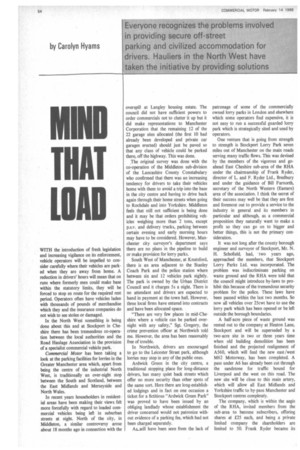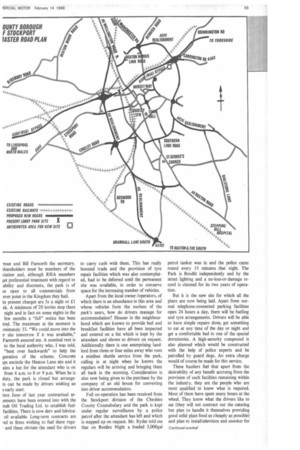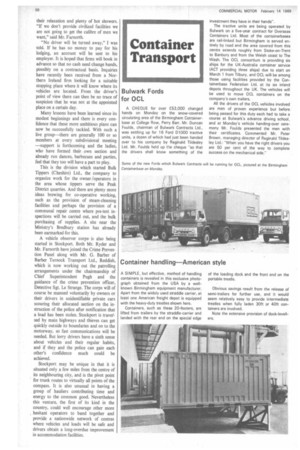MIN THAT LOAD
Page 56

Page 57

Page 58

If you've noticed an error in this article please click here to report it so we can fix it.
WITH the introduction of fresh legislation and increasing vigilance on its enforcement, vehicle operators will be impelled to consider carefully where their vehicles are parked when they are away from home. A reduction in drivers' hours will mean that on runs where formerly men could make base within the statutory limits, they will be forced to stop en route for the required rest period. Operators often have vehicles laden with thousands of pounds of merchandise which they and the insurance companies do not wish to see stolen or damaged.
In the North West something is being done about this and at Stockport in Cheshire there has been tremendous co-operation between the local authorities and the Road Haulage Association in the provision of a specialist commercial vehicle park.
Commercial Motor has been taking a look at the parking facilities for lorries in the Greater Manchester area which, apart from being the centre of the industrial North West, is traditionally an over-night stop between the South and Scotland, between the East Midlands and Merseyside and North Wales.
In recent years householders in residential areas have been making their views felt more forcefully with regard to loaded commercial vehicles being left in suburban streets at night. North of the city, in Middleton, a similar controversy arose about 18 months ago in connection with the overspill at Langley housing estate. The council did not have sufficient powers to order commercials not to clutter it up but it did make representations to Manchester Corporation that the remaining 12 of the 22 garage sites allocated (the first 10 had already been developed and private car garages erected) should just be paved so that any class of vehicle could be parked there, off the highway. This was done.
The original survey was done with the co-operation of the Middleton sub-division of the Lancashire County Constabulary who confirmed that there was an increasing tendency for drivers to take their vehicles home with them to avoid a trip into the base in the city centre and having to drive back again through their home streets when going to Rochdale and into Yorkshire. Middleton feels that still not sufficient is being done and it may be that orders prohibiting vehicles weighing more than 2 tons, except p.s.v. and delivery trucks, parking between certain evening and early morning hours may have to be considered. However, Manchester city surveyor's department says there are no plans in the pipeline to build or make provision for lorry parks.
South West of Manchester, at Knutsford, there is an area adjacent to the Stanley Coach Park and the police station where between six and 12 vehicles park nightly. The park is owned by the Urban District Council and it charges 5s a night. There is no attendant and drivers are expected to hand in payment at the town hall. However. three local firms have entered into contracts and have been allocated space.
"There are very few places in mid-Cheshire where a vehicle can be parked overnight with any safety," Sgt. Gregory, the crime prevention officer at Northwich told me. However, the area has been reasonably free of trouble.
In Northwich, drivers are encouraged to go to the Leicester Street park, although lorries may stop in any of the public ones.
Ardwick Green in the city centre, a traditional stopping place for long-distance drivers, has many quiet back streets which offer no more security than other spots of the same sort. Here there are long-established lodgings and in fact on one occasion a ticket for a fictitious "Ardwick Green Park" was proved to have been issued by an obliging landlady whose establishment the driver concerned would not patronize without evidence of a parking fee, which had not been charged separately.
As_will have been seen from the lack of patronage of some of the commercially owned lorry parks in London and elsewhere which some operators find expensive, it is not easy to run a successful guarded lorry park which is strategically sited and used by operators.
One venture that is going from strength to strength is Stockport Lorry Park seven miles out of Manchester on the main roads serving many traffic flows. This was devised by the members of the vigorous and goahead East Cheshire sub-area of the RHA under the chairmanship of Frank Ryder, director of L. and F. Ryder Ltd., Bredbury and under the guidance of Bill Farnorth, secretary of the North Western (Eastern) area of the association. I think the secret of their success may well be that they are first and foremost out to provide a service to the industry in general and its members in particular and although, as a commercial proposition they naturally want to make a profit so they can go on to bigger and better things, this is not the primary consideration.
It was not long after the county borough engineer and surveyor of Stockport, Mr. N. H. Schofield, had, ' two years ago, approached the members, that Stockport Lorry Parks Ltd. was incorporated. The problem was indiscriminate parking on waste ground and the RHA were told that the council might introduce by-laws to prohibit this because of the tremendous security problem for the police. These laws have been passed within the last two months. So now all vehicles over 25cwt have to use the lorry park which has been opened or be left outside the borough boundaries.
A half-acre piece of waste ground was rented out to the company at Heaton Lane, Stockport and will be superseded by a two-acre site in two or three years time when old building demolition has been finished and the projected realignment of A560, which will feed the new east /west M62 Motorway, has been completed. A pass under A6 has already been cut through the sandstone for traffic bound for Liverpool and the west on this road. The new site will be close to this main artery, which will allow all East Midlands and Yorkshire traffic to by-pass Manchester and Stockport centres completely.
The company, which is within the aegis of the RHA, invited members from the sub-area to become subscribers, offering shares at £25 each, and being a private limited company the shareholders are limited to 50. Frank Ryder became its man and Bill Farnorth the secretary. shareholders must be members of the ciation and, although RHA members get preferential treatment with regard to ability and discounts, the park is of se open to all commercials from ..ever point in the Kingdom they hail.
he present charges are 5s a night or £1 ek. A minimum of 20 lorries stop there night and in fact on some nights in the few months a "full" notice has been ired. The maximum at the moment is oximately 33. "We could move into the T site tomorrow if it was available," Farnorth assured me. A nominal rent is to the local authority who, I was told, "bent over backwards" to help the guration of the scheme. Concrete ips encircle the Heaton Lane site and it ains a hut for the attendant who is on from 6 a.m. to 8 or 9 p.m. When he is duty, the park is closed but arrangets can be made by drivers wishing an s-early start.
[lice June of last year contractual ar;ements have been entered into with the nah Oil Trading Ltd. to establish fuelfacilities. There is now dery and lubricaoil available. Long-term contracts are -ed to firms wishing to fuel there reguand these obviate the need for drivers to carry cash with them. This has really boosted trade and the provision of tyre repair facilities which was also contemplated, had to be deferred until the permanent site was available, in order to conserve space for the increasing number of vehicles.
Apart from the local owner /operators, of which there is an abundance in this area and whose vehicles form the nucleus of the park's users, how do drivers manage for accommodation? Houses in the neighbourhood which are known to provide bed and breakfast facilities have all been inspected and entered on a list which is kept by the attendant and shown to drivers on request. Additionally there is one enterprising landlord from three or four miles away who runs a minibus shuttle service from the park, calling in at night when he knows the regulars will be arriving and bringing them all back in the morning. Consideration is also now being given to the purchase by the company of an old house for converting into driver accommodation.
Full co-operation has been received from the Stockport division of the Cheshire County Constabulary and the park is kept under regular surveillance by a police patrol after the attendant has left and which is stepped up on request. Mr. Ryder told me that on Bonfire Night a loaded 5,000gal petrol tanker was in and the police came round every 15 minutes that night. The Park is floodlit independently and by the street lighting and a no-loss-or-damage record is claimed for its two years of operation.
But it is the new site for which all the plans are now being laid. Apart from normal telephone-connected parking facilities open 24 hours a day, there will be fuelling and tyre arrangements. Drivers will be able to have simple repairs done, get something to eat at any time of the day or night and get a comfortable bed in one of the special dormitories. A high-security compound is also planned which would be constructed with the help of police experts and be patrolled by guard dogs. An extra charge would of course be made for this service.
These hauliers feel that apart from the desirability of any benefit accruing from the provision of such facilities remaining within the industry, they are the people who are most qualified to know what is required. Most of them have spent many hours at the wheel. They know what the drivers like to eat (they will not contract out the catering but plan to handle it themselves providing good solid plain food as cheaply as possible) and plan to installtelevision and snooker for their relaxation and plenty of hot showers. "If we don't provide civilized facilities we are not going to get the calibre of men we want," said Mr. Farnorth.
"No driver will be turned away," I was told. If he has no money to pay for his lodging, an account will be sent to his employer. It is hoped that firms will book in advance so that no cash need change hands, possibly on a contractual basis. Inquiries have recently been received from a Northern Ireland firm looking for a suitable stopping place where it will know where its vehicles are located. From the driver's point of view there can then be no trace of suspicion that he was not at the appointed place on a certain day.
Many lessons have been learned since its modest beginnings and there is every confidence that these more ambitious plans can now be successfully tackled. With such a live group—there are generally 100 or so members at every subdivisional meeting —support is forthcoming and the ladies, who have formed their own section and already run dances, barbecues and parties, feel that they too will have a part to play.
This is the division which started Bulk Tippers (Cheshire) Ltd., the company to organize work for the owner/operators in the area whose tippers serve the Peak District quarries. And there are plenty more ideas brewing for co-operative working, such as the provision of steam-cleaning facilities and perhaps the provision of a communal repair centre where pre-test inspections will be carried out, and the bulk purchasing of supplies. A site near the Ministry's Bredbury station has already been earmarked for this.
A vehicle observer corps is also being started in Stockport. Both Mr. Ryder and Mr. Famorth have joined the Crime Prevention Panel along with Mr. C. Barber of Barber Turnock Transport Ltd., Reddish, which is now working out the patrolling arrangements under the chairmanship of Chief Superintendent Pugh and the guidance of the crime prevention officer, Detective Sgt. Le Strange. The corps will of course be manned voluntarily by owners or their drivers in unidentifiable private cars scouring their allocated section on the instruction of the police after notification that a load has been stolen. Stockport is traveesed by main highways and thieves can get quickly outside its boundaries and on to the motorway, so fast communications will be needed. But lorry drivers have a sixth sense about vehicles and their regular habits, and if they and the police can gain each other's confidence much could be achieved.
Stockport may be unique in that it is situated only a few miles from the centre of its neighbouring city, and is the pivot point for trunk routes to virtually all points of the compass. It is also unusual in having a group of hauliers contributing time and energy to the common good. Nevertheless this venture, the first of its kind in the country, could well encourage other more hesitant operators to band together and provide a nationwide network of centres where vehicles and loads will be safe and drivers obtain a long-overdue improvement in accommodation facilities.


















































































































